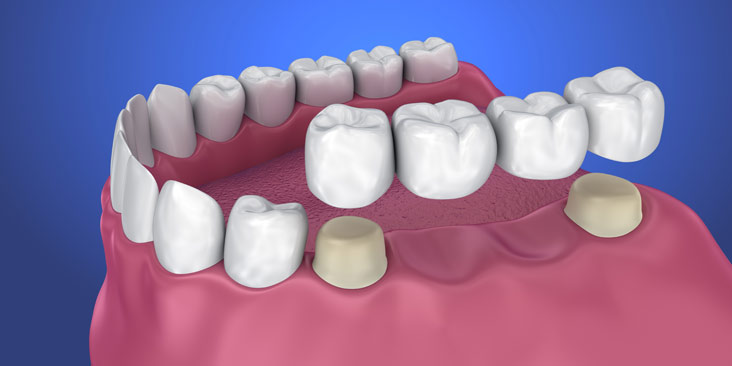Dental bridges and implants are the two most recommended tooth replacement options today. Although both are excellent restorative choices, there are instances wherein getting a dental bridge may be the only way to have a complete set of teeth again.
Dental bridges are often recommended to patients who lost one or more teeth, and the neighboring ones have large fillings and may require crowns or caps in the future.
Additionally, this restorative treatment is recommended to patients whose gums and bones have receded and will require a lot of time and dental work before they can get implants. They can get custom-made dental bridges to replace the lost teeth temporarily or permanently.
What Happens After You are Fitted With Dental Bridges?
If you are getting dental bridges, the first thing you have to know is that the whole procedure usually takes two or three appointments to complete.
Before you get your fixed bridge, on your first appointment, you will be given a temporary one after the surrounding teeth are prepared. This dental appliance is placed to protect the primed teeth and gum tissue while the permanent crown or bridge is being produced.
This temporary bridge will prevent the primed surrounding teeth from shifting or moving unnecessarily as well.
The permanent or fixed bridge is often cemented on your third visit. It can also be done during your second appointment if the prosthetic perfectly fits the space and the prepared adjacent teeth.
Possible Issues
Once your permanent bridge is fitted, you may feel some discomfort which can range from mild to moderate. This pain, inflammation, or bruising around the gums disappears after a few days.
However, if the pain does not subside within a week and even intensifies, you need to see your dentist immediately since this may be a sign that you have an infection or an ill-fitting dental bridge.
Additionally, you may also suffer from sudden sensitive teeth. Tooth sensitivity typically happens after dental bridge implantation and usually lasts for two to three weeks.
You can use toothpaste for sensitive teeth to relieve this discomfort. In case your tooth sensitivity does not disappear within the mentioned period, see your dentist.
Changes in Your Diet
When you have fixed bridges or any dental appliances, you will have to make some simple tweaks in your diet to avoid complications and protect and prolong the functionality of your prosthetics.
For starters, you will have to avoid or reduce your intake of sugary foods. Although your dental bridge won’t be affected by decay, the neighboring natural teeth are still prone to developing cavities.
If you consume too many sweet treats and beverages, the adjacent natural teeth will be more prone to decay. In case this happens, your bridge can become loose and even fall out.
You will have to avoid sticky foods as well. Chewing gum, caramel, fudge, and other types of chewy candies can get stuck in the dental bridge and pull it right out. Additionally, since they contain sugar, they can also cause tooth decay.
Caring for Your Dental Bridge
To keep your dental bridge in excellent form and prolong its useful life, follow these tips:
- Brush twice a day. Use a soft-bristled toothbrush and high fluoride toothpaste to prevent root decay. You can follow up your brushing routine with a fluoride rinse to better protect and clean your natural and false teeth.
- Floss daily. Make sure you reach the area under the prosthetics; you can use a bridge threader to do this. Don’t forget to floss properly between your natural teeth as well.
- Eat more fruits, vegetables, and fiber-rich foods than meat. This will help you avoid damaging your prosthetics and, at the same time, maintain good oral health.
- Avoid chewing or biting ice cubes. If you do, you may fracture your false tooth and even the natural ones. In case you also have the habit of nibbling on hard objects such as pens or pencils, stop it as soon as possible.
- Visit your dentist on schedule or at least twice a year. Get professional cleaning at least once annually as well.
Many reputable cosmetic dentists agree that a dental bridge is one of the best restorative treatments around. To ensure that this is the best option for you, discuss everything with your specialist during your consultations.
